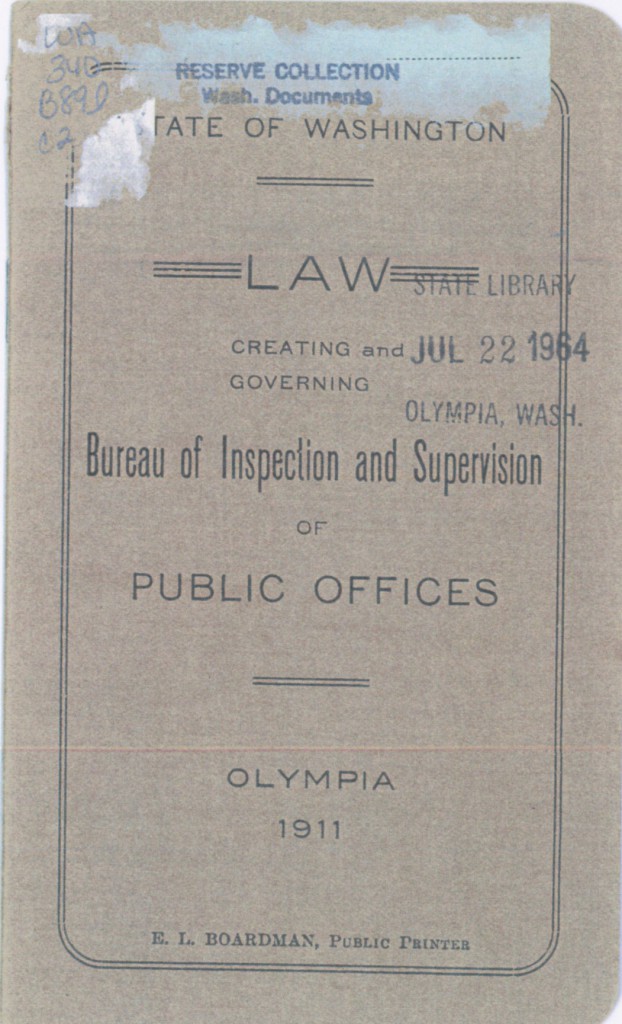The Exciting World of Accounting!
 From the desk of Steve Willis, Central Library Services Program Manager of the Washington State Library
From the desk of Steve Willis, Central Library Services Program Manager of the Washington State Library
My Father was an accountant, and when he wanted us kids to get sleepy and not stay up too late, all he had to do was talk about his job. But before you dismiss the profession of accounting as a boring and tedious vocation, consider this front page story from the Sept. 14, 1911 issue of the Olympia Daily Recorder:
STATE OFFICIAL IN SHERIFF’S IRONS — TRIES ON ANKLET ONLY TO FIND KEY IS LOST
“Another state official was in sheriff’s irons at the court house this morning and secured his release with difficulty, although without bail. F.H. Lieben, member of the state board of supervision and inspection of public offices literally put himself in the toils, not of the law but of the implements of the law, and as he sat ruminating at the ways of folly, swore by the board of the prophet, the sacred bull of Osiris, Anthony Comstock and such other traditional symbols of grace and virtue that if he ever got out this time he never would get in again. Lieben, whose business it is to examine the accounts of public officers to see that they don’t get too careless in office, himself got too careless in the office of Sheriff Gaston, and trying on one of the big leg irons out of curiosity, had his curiosity amply satisfied when he discovered he could not get it off and the key could not be found. And for more than an hour Lieben sat and winced at the jibes of the county officials who dropped in to see the new prisoner, and at the clanking galling ankle iron. Some were for getting him a copy of Byron’s ‘Prisoner of Chilon’ to read for consolation, but Lieben would have none of poetry. He wanted ‘out,’ nothing else.”
“Lieben called on the sheriff this morning about 8 o’clock on a matter of business. While the two were talking Lieben toyed with a pair of heavy leg irons and when the sheriff had his back turned slipped one the anklets on. The irons are worked by a spring lock and Lieben found himself caught tight around the ankle. Explaining how it happened they slipped tighter until they pinched uncomfortably.”
“For a half hour the sheriff conducted an unavailing search for the key. In the meantime pretended news of the arrest of Lieben on a serious charge was spread through the court house and officials gathered to josh him. After trying all the keys in the office without getting one to work, Clyde Duval, the forest ranger, began to file one down but this was slow, so Charles Talcott was called into consultation. While he was making a key Duval finished his and the leg irons were finally slipped off the state officer. He tried his best to cajole the crowd that had gathered and the newspaper men to secrecy but they wouldn’t fall, and so the story is being told all about town.”
Francis Henry Lieben was born Sept. 21, 1860 in Dubuque, Iowa. He was raised in Iowa, Pennsylvania, and Minnesota. In the late 1890s, along with his wife Mary and son Howard, he migrated to Davenport, Washington, where he worked as a bookkeeper. In 1909 the family moved to Seattle.
Lieben found employment as one of the original three board members of the Bureau of Inspection and Supervision of Public offices, which was created in 1909 as a department of the State Auditor. This watchdog trio must have been effective in finding accounting problems in local governments. Someone disliked them enough to get an initiative on the ballot in 1914 to abolish the Bureau. Initiative Measure No. 7, which is found in the very first Washington voter’s pamphlet, was soundly defeated by the voters in 1914.

In a publication describing their mission ca. 1917, the Bureau commented:
“It cannot be expected that governing officers having disregarded the welfare of their constituents will call in examiners to expose their shortcomings.”
“The public spoke after a strenuous campaign in 1915 [i.e. 1914] on Initiative Measure No. 7 in no uncertain way by sustaining the bureau by a large majority.”
“It is to be regretted that designing politicians who know nothing of our work and care less, having never darkened our doors should on account of some personal pique, biennially harass and belittle so important a work as is being accomplished by the Bureau.”
The Bureau existed until 1921, when it was superceded by the Dept. of Efficiency. The Washington State Library has several publications from the short-lived Bureau.
Meanwhile, Lieben served on the Bureau until Jan. 1913, when he became a regular examiner for the State Auditor. He retired in 1932.
In Sept. 1918 his ankle once again made the news. A truck ran over his left foot at the corner of Madison and 2nd in downtown Seattle, and the newspaper thought Lieben might have to have the foot and ankle amputated. A month later his wife Mary died.
He remarried in 1921 and lived a long life, dying in Seattle Dec. 3, 1958, age 98.
A couple of the background characters in the above news article are worth noting. George Gaston (1849-1930) was Sheriff and later Assessor of Thurston County. He was married to a descendant of African-American Tumwater pioneer George Washington Bush. Charles Talcott (1854-1939) was an early Olympia jeweler who is known as the designer of the original Washington State seal in 1889.
The Olympia Daily Recorder can be counted as one of the ancestors of the current Olympian news paper.
You can follow any responses to this entry through the RSS 2.0 feed. Both comments and pings are currently closed.






